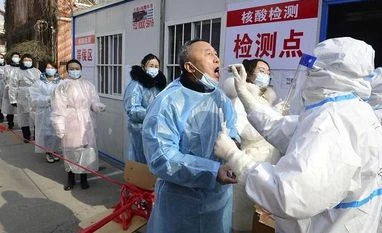The latest curbs, which will delay the start of the school year for some, reflect China's strict adherence to a "dynamic COVID zero" policy of quashing every flare-up.
That insistence makes it an outlier as the rest of the world tries to live with coronavirus despite the cost to the world's second-largest economy.
While many of the measures are initially planned to run just a few days, any major escalation or extension in some of China's biggest cities risks further hurting already tepid growth.
While the two most populous cities of Beijing and Shanghai have faced only sporadic cases recently, COVID worries still
weighed on Chinese stocks.
"Markets could once again be hit in the next couple of weeks, likely triggering another round of cuts by economists on the street," Nomura warned in a note, highlighting the significance of cities such as Shenzhen, also a major port.
On Tuesday, the Shenzhen district of Longhua, which has 2.5 million residents, closed entertainment venues and wholesale markets, and suspended large events.
People must show proof of negative test results within 24 hours to enter residential compounds, and restaurants must limit patrons to half of capacity, Longhua's district authorities said. The new curbs will run until Saturday.
The moves followed similar measures on Monday covering three other districts that affected over 6 million in Shenzhen, which has fought outbreaks of Omicron sub-variants this year.
City officials have stopped short of a blanket delay for the new school year, but six parents of young children said their schools had told them of postponements, as many in parent chat groups expressed anxiety over the uncertainty.
PORT CITY SHUT DISTRICTS
In Dalian, a major import hub for soybeans and iron ore, a lockdown begun on Tuesday is set to run until Sunday in the main urban areas with about 3 million residents. Households may send one person each day to shop for daily needs.
The lockdown requires non-essential workers to work from home, while manufacturing companies must cut on-site staff and maintain only basic and urgent operations.
The southwestern city of Chengdu, with a population of 21 million, ordered blanket closure of public entertainment and cultural venues from Tuesday.
It planned to delay the start of the fall school semester, and mandated residents to have proof of negative test result within 24 hours for entry to certain areas.
The northern municipality of Tianjin, home to 13.7 million, started a new round of citywide COVID testing, its fourth since Saturday.
The city of Tianjin said it would delay resuming offline classes for many schools.
In the northern city of Shijiazhuang, about 3-1/2-hours drive from Beijing, four big districts have ordered more than 3 million people to work from home until Wednesday afternoon, except for those in essential jobs.
Mainland China reported 1,717 domestically transmitted COVID infections for Aug. 29, 349 of these symptomatic and 1,368 asymptomatic, official data showed on Tuesday.
From more than 20 places that reported infections for Monday, Tibet, Qinghai and the province of Sichuan, of which Chengdu is the capital, accounted for the bulk of daily cases.
Qinghai's capital of Xining, with a population of 2.5 million, ordered a lockdown from Monday until Thursday morning in key urban areas, halting public transport and limiting movement.
Cases have been rising in Hong Kong, which does not have the same zero-COVID measures as mainland China, with government advisers expecting a daily tally of 10,000 infections this week, fanning fears of a tightening of just-eased curbs.
To read the full story, Subscribe Now at just Rs 249 a month
Already a subscriber? Log in
Subscribe To BS Premium
₹249
Renews automatically
₹1699₹1999
Opt for auto renewal and save Rs. 300 Renews automatically
₹1999
What you get on BS Premium?
-
Unlock 30+ premium stories daily hand-picked by our editors, across devices on browser and app.
-
Pick your 5 favourite companies, get a daily email with all news updates on them.
Full access to our intuitive epaper - clip, save, share articles from any device; newspaper archives from 2006.
Preferential invites to Business Standard events.
Curated newsletters on markets, personal finance, policy & politics, start-ups, technology, and more.
Need More Information - write to us at assist@bsmail.in
)